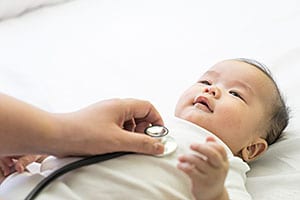#17,081
While we wait for the next wave of COVID, and the expected early arrival of influenza, the nation is battling a surge in RSV (respiratory syncytial virus) that is filling emergency rooms around the country with (mostly) pediatric patients (see KHN Uncharted Territory’: Covid, Flu, RSV Infections All Expected To Rise).
While thought of primarily as a pediatric disease, RSV can affect anyone, and claims the lives of thousands of elderly people every year.
CDC HAN #00473: Severe Respiratory Illnesses Associated with Rhinoviruses and/or Enteroviruses Including EV-D68 – Multistate, 2022
CDC HAN Advisory: Recent Reports of Human Parechovirus (PeV) in the United States—2022
Given the recent spike in RSV cases, it is little surprise that overnight the CDC updated their RSV Symptoms and Care web page (see below).
Symptoms and Care
Español (Spanish) | Print
Symptoms
People infected with RSV usually show symptoms within 4 to 6 days after getting infected. Symptoms of RSV infection usually includeThese symptoms usually appear in stages and not all at once. In very young infants with RSV, the only symptoms may be irritability, decreased activity, and breathing difficulties.
- Runny nose
- Decrease in appetite
- Coughing
- Sneezing
- Fever
- Wheezing
Almost all children will have had an RSV infection by their second birthday.
Call your healthcare professional if you or your child is having difficulty breathing, not drinking enough fluids, or experiencing worsening symptoms.
Care
Most RSV infections go away on their own in a week or two.
- There is no specific treatment for RSV infection, though researchers are working to develop vaccines and antivirals (medicines that fight viruses).
- Take steps to relieve symptoms
- Manage fever and pain with over-the-counter fever reducers and pain relievers, such as acetaminophen or ibuprofen. (Never give aspirin to children.)
- Drink enough fluids. It is important for people with RSV infection to drink enough fluids to prevent dehydration (loss of body fluids).
- Talk to your healthcare provider before giving your child nonprescription cold medicines. Some medicines contain ingredients that are not good for children.
- RSV can cause more serious health problems
RSV can also cause more severe infections such as bronchiolitis, an inflammation of the small airways in the lung, and pneumonia, an infection of the lungs. It is the most common cause of bronchiolitis and pneumonia in children younger than 1 year of age.
https://khn.org/morning-breakout/uncharted-territory-covid-flu-rsv-infections-all-expected-to-rise/
Healthy adults and infants infected with RSV do not usually need to be hospitalized. But some people with RSV infection, especially older adults and infants younger than 6 months of age, may need to be hospitalized if they are having trouble breathing or are dehydrated. In the most severe cases, a person may require additional oxygen or intubation (have a breathing tube inserted through the mouth and down to the airway) with mechanical ventilation (a machine to help a person breathe). In most of these cases, hospitalization only lasts a few days.
Learn more about people at high risk for severe RSV infection.
Without an RSV vaccine, we are left with old-school preventative measures, such as avoiding sick individuals, hand washing, and cleaning and disinfecting contaminated surfaces.
Fasten your seat belts and pass the hand sanitizer. We could be in for a bumpy `flu' season.



